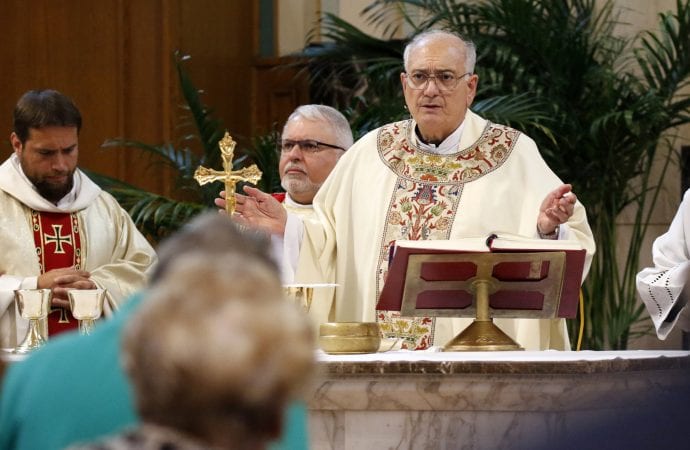Bishop Nicholas DiMarzio of Brooklyn has been appointed by the Vatican to conduct an investigation of the troubled Buffalo diocese in New York, where Bishop Richard Malone faces accusations of covering up sexual abuse by priests.
The announcement was made late Thursday by the Brooklyn diocese, following a request from the papal embassy in the U.S. A communique from the embassy stated that DiMarzio would conduct an apostolic visitation, which it described as “a non-judicial and non-administrative process that requires confidentiality.”
The communique from the papal embassy also said the investigation would not be subject to the recent papal decree Vos Estis, which established new legal norms to hold bishops and other superiors accountable for their handling of abuse complaints.
Father Steven Aguggia, Judicial Vicar of the Diocese of Brooklyn, will serve as DiMarzio’s secretary for purposes of the investigation.
Malone has been under fire for more than a year and has rejected calls for his resignation. A recent poll by the Buffalo News claimed 86 percent of residents of the diocese want him to go, and the “Movement to Restore Trust,” the leading lay reform group in the diocese, has asked for his resignation despite previously pledging to work with Malone to implement reforms.
Nevertheless, Malone said in mid-September he would be “very open” to a Vatican review to “let all the truth come out.”
In his own statement Thursday, Malone said he’s “committed to cooperate fully” with DiMarzio’s probe and said it will be “for the good of the Church in Buffalo.”
Malone’s former secretary has leaked hundreds of pages of diocesan records alleging that Malone had allowed accused priests to stay on the job and that he has actively engaged in abuse cover-up. Malone’s priest secretary, Father Ryszard Biernat, also has leaked secret recordings in which Malone voiced concerns that one of those scandals could force him to resign.
Biernat himself faces allegations that he engaged in a longtime relationship with Matthew Bojanowski, a former diocesan seminarian. Despite the publication of correspondence between Biernat and Bojanowki that appears romantic in nature, Malone has said he has no reason not to believe the relationship to be platonic.
In an interview with a local Buffalo station, Malone said the diocese currently is facing 138 abuse lawsuits since a “look back” window in New York state took effect in August. He said his advisors estimate a total of 250-275 lawsuits will be filed, and that the diocese is in “very serious discernment” over whether to file for bankruptcy.
DiMarzio, who’s 75 and has already submitted his resignation from Brooklyn to Pope Francis, released a statement Thursday on the appointment.
“This is a difficult period in the life of the Church in Buffalo,” DiMarzio said in the statement. “I pledge I will keep an open mind throughout the process and do my best to learn the facts and gain a thorough understanding of the situation in order to fulfill the mandate of this Apostolic Visitation.”
“Our Holy Father has a great devotion to Our Lady Untier of Knots,” he said. “I beg the intercession of the Blessed Mother, that I may be an instrument for surfacing the truth so that justice might be served and God’s mercy experienced.”
“Upon completion of the visitation, I will submit a report to the Congregation of Bishops at the Vatican.”
The statement indicated that neither DiMarzio nor his spokeswoman will make any further comment on this matter.
Born in Newark, New Jersey in 1944, DiMarzio is the grandson of Italian immigrants to the U.S. and has long been outspoken in defense of immigrant rights. He’s dealt with the abuse scandals since the late 1990s, when he was appointed as the bishop of Camden, New Jersey, where he established an outside line to allow potential victims to report abuse directly to the local District Attorney, bypassing any involvement by the Church.
Since 2002, the Brooklyn diocese has shared all of its files and allegations against priests with the district attorneys of Brooklyn and Queens. In 2004, DiMarzio established a telephone hotline for anyone to report allegations of sexual abuse.
In 2009 DiMarzio published a presentation to the people of the Diocese of Brooklyn on the abuse scandals, outlining local efforts in terms of investigating and reporting abuse, as well as accountability, reconciliation, prevention, and victim assistance. He also celebrates an annual Mass for healing which is planned by survivors.
Last February, DiMarzio authorized the release of names of 108 Brooklyn priests credibly accused of child abuse over the diocese’s 166-year history. The bulk of cases involved priests ordained between 1930 and 1979, and the diocese said at the time there’ve been just two cases since the U.S. Church enacted reforms in 2002.
DiMarzio said at the time he hoped having the names public would provide a layer of healing for victims “on their journey toward wholeness.”
In a late September interview with Crux, DiMarzio said that his conversations with abuse survivors over the years have been “shattering.”
“These are traumatic experiences that really do change people’s lives,” he said. “I’d say 95 percent of the cases are real, they’re not fake. I started to see it’s clear people are not lying. That’s it, this is what happened.”
“Reconciliation isn’t just putting money in somebody’s pocket,” DiMarzio said. “It’s an apology on behalf of the Church by somebody in authority.”
The DeSales Media Group in the Diocese of Brooklyn is a principal sponsor of Crux.

